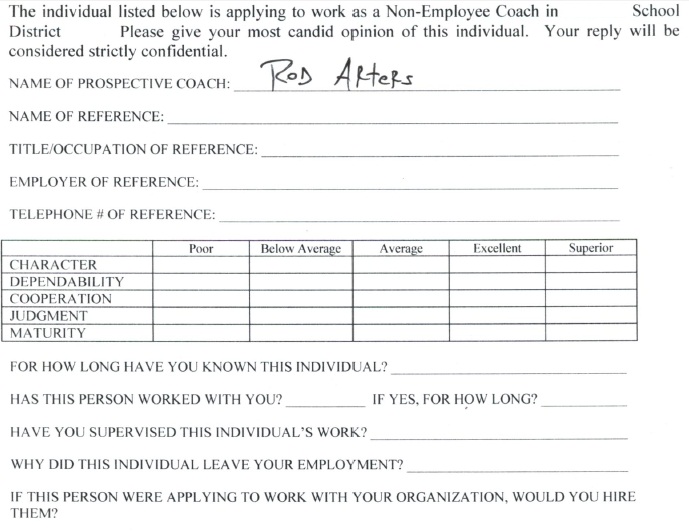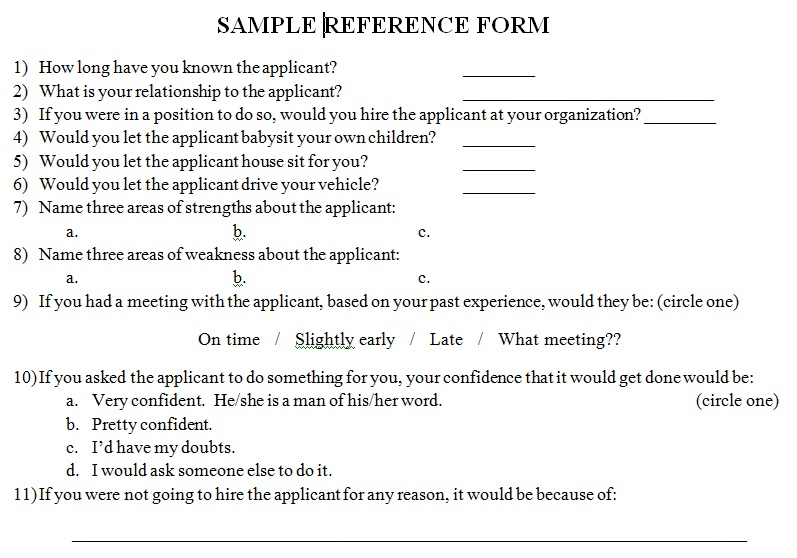I recently applied to join the coaching staff of a local high school to work with their volleyball program. As is customary, I had to fill out a lengthy application and submit a few references. In this day and age, they need to make sure I do not have a criminal record or appear on any sex offender list. (FYI, I do not). I’m grateful for the background check and thorough nature of the application process. At the same time, I am amused at the necessary reference form.
By definition, a ref·er·ence is:
- A person who is in a position to recommend another or to vouch for his or her fitness, as for a job.
- A statement about a person’s qualifications, character, and dependability.
The school’s particular reference form is adequate and generic. See for yourself, below. I just question whether it is a truly effective tool for weeding out bad seed.
 It is good to know how long you have known the applicant and under what capacity. It is smart to learn what you can about the applicant’s character, judgment and maturity from their friends or former colleagues. It’s best to know if they are dependable before you go depending on them. I think it is wise to try to discern someones strengths and weaknesses before you hire them. Anytime you can hear from a co-worker or former employer, it can give you insight that the personal interview cannot provide. Nobody wants any surprises with a new hire. On the form above, the best question is whether the person giving the reference would hire the applicant. If the reference form had only one question on it, it should be that one.
It is good to know how long you have known the applicant and under what capacity. It is smart to learn what you can about the applicant’s character, judgment and maturity from their friends or former colleagues. It’s best to know if they are dependable before you go depending on them. I think it is wise to try to discern someones strengths and weaknesses before you hire them. Anytime you can hear from a co-worker or former employer, it can give you insight that the personal interview cannot provide. Nobody wants any surprises with a new hire. On the form above, the best question is whether the person giving the reference would hire the applicant. If the reference form had only one question on it, it should be that one.
I don’t have a problem with the need for references. I’m glad they ask for them and I hope they contact them with any follow-up questions. What confuses me is why we place so much emphasis on the reference’s opinion of the applicant. I mean, isn’t the reference always loyal to the applicant? Is the positive reference truly an indicator that you are about to hire a positive applicant? Aren’t we all able to answer most questions in a way that hides our true feelings while still being positive and honest? Should we really blindly trust the opinion of the applicant’s closest friend? How do we know that the reference isn’t a sex offending, ex-con, drug dealing pimp who was offered $20 bucks for the positive reference?
If I want a job and you need a reference, naturally, I’m going to introduce you to someone who thinks I hung the moon. I will send the form to those who owe me money or to those whose child I pushed away from an oncoming train. You want to hear how great I am? Ok, let me find the 5 people (or 500 people) who actually think I am great and I will let your opinion of me be formed by them.
However, at this stage in my adult life, there are undoubtedly a few people walking the planet who dislike me. I might even have some out there who hate me. Needless to say, they will not be getting a reference form to fill out. Who wants their opinion anyway?? Maybe a prospective employer!?
In the future, a prospective employer should ask each applicant for four references. Some from people who like you (allies) and some from people who do not (enemies). Then, once the forms are back, the employer (or his committee) can read through the true nature of a candidate, not just the positive version they are portraying through positive, loyal references.
Company assets and reputations need to be protected. Sensitive client information and trade secrets need to be protected. More importantly, children/youth (and the organizations that deal with them) need to be protected. For these reasons, reference forms need to be filled out and follow-up phone calls need to occur. How many young people could have been protected from various abuses over the years had schools/organizations had better forms and better screening processes? How many young people could have been saved from unnecessary trauma and scars if the hiring organization did a better job of researching the character and evaluating the integrity of those they hired?
Below is a sample reference form. The questions are a bit more probing and require straight-forward, honest answers. No reference form will be fool-proof or be able to reveal the bad eggs instantly. But maybe we need to do a background check on the references as well as the applicants?
How about you? What question would you want to know the answer to before you offered someone in your company a job?
